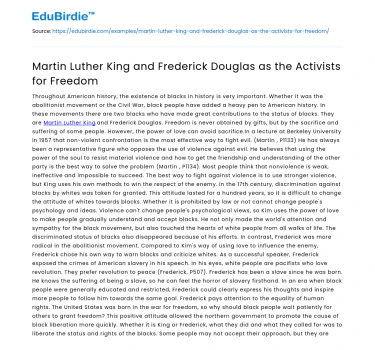Introduction
Martin Luther King Jr. and Frederick Douglass stand as towering figures in the annals of American history, both revered for their enduring activism in the pursuit of freedom and equality. Their lives, though separated by nearly a century, are intertwined by a shared commitment to justice and human rights. Douglass, a former slave, rose to prominence in the 19th century as a leading voice in the abolitionist movement, while King emerged in the mid-20th century as the emblematic leader of the Civil Rights Movement. Despite the different contexts of their activism, both men utilized compelling rhetoric and nonviolent advocacy to challenge deeply entrenched systems of oppression. By examining their contributions and the contexts in which they operated, we gain insight into the evolution of social justice movements in the United States. This essay explores the activism of Martin Luther King Jr. and Frederick Douglass, highlighting their strategies, impact, and the enduring relevance of their legacies in the ongoing struggle for freedom and equality.
Frederick Douglass: Abolitionist and Orator
Frederick Douglass's journey from slavery to statesmanship is a testament to the power of resilience and eloquence in the fight for freedom. Born into slavery in Maryland in 1818, Douglass's early life was marked by the brutal realities of servitude, which he vividly recounted in his seminal autobiography, "Narrative of the Life of Frederick Douglass, an American Slave." His escape to the North in 1838 marked the beginning of a lifelong crusade against the institution of slavery. Douglass became a prominent orator and writer, using his platform to expose the moral and ethical failures of slavery. His speeches, such as "What to the Slave is the Fourth of July?" delivered in 1852, challenged the hypocrisy of a nation that celebrated freedom while perpetuating bondage.
Save your time!
We can take care of your essay
- Proper editing and formatting
- Free revision, title page, and bibliography
- Flexible prices and money-back guarantee
Douglass's activism extended beyond abolitionism. He was an advocate for women's rights, aligning himself with suffragists like Susan B. Anthony and Elizabeth Cady Stanton. This intersectional approach to social justice highlighted his understanding of the interconnectedness of different forms of oppression. Douglass's rhetorical prowess and strategic alliances were crucial in galvanizing public opinion and influencing political change. His insistence on the immediate abolition of slavery and the enfranchisement of African Americans laid the groundwork for the Civil Rights Movement that followed. While some contemporaries argued for a more gradual approach to emancipation, Douglass's unwavering demand for immediate action underscored his belief in the inherent dignity and equality of all individuals.
Martin Luther King Jr.: The Dream of Equality
Martin Luther King Jr.'s leadership during the Civil Rights Movement of the 1950s and 1960s exemplified the power of nonviolent resistance and moral persuasion. Born in 1929 in Atlanta, Georgia, King's early exposure to the systemic racism of the Jim Crow South shaped his commitment to social justice. Influenced by Mahatma Gandhi's principles of nonviolent protest, King led campaigns that sought to dismantle segregation and secure voting rights for African Americans. His leadership of the Montgomery Bus Boycott in 1955 marked a pivotal moment in the movement, demonstrating the effectiveness of coordinated, peaceful protest.
King's most famous address, the "I Have a Dream" speech delivered during the 1963 March on Washington, articulated a vision of racial harmony and equality. This speech, with its powerful imagery and rhetorical flourishes, inspired millions and became a defining moment in American history. King's advocacy extended beyond racial issues; he also spoke out against poverty and the Vietnam War, highlighting his broader vision for social justice. However, King's approach faced criticism from both sides; some activists, like Malcolm X, argued for more radical measures, while others accused King of being too conciliatory. Despite these challenges, King's steadfast commitment to nonviolence and his ability to mobilize diverse coalitions were instrumental in achieving landmark legislative victories, such as the Civil Rights Act of 1964 and the Voting Rights Act of 1965.
Legacy and Impact: A Comparative Analysis
The legacies of Frederick Douglass and Martin Luther King Jr. continue to resonate in contemporary discussions on race and equality. Both men understood the transformative power of rhetoric and the necessity of challenging societal norms to effect change. Douglass's writings and speeches provided a moral framework that informed future generations of activists, while King's strategies of nonviolent resistance have been emulated by movements worldwide, from the anti-apartheid struggle in South Africa to the recent Black Lives Matter protests.
Despite their successes, both Douglass and King faced significant opposition and personal sacrifice. Douglass endured threats and violence, while King was ultimately assassinated for his beliefs. Their willingness to confront these challenges head-on underscores the personal risks inherent in activism. Moreover, their experiences highlight the ongoing nature of the fight for justice; the issues they addressed continue to manifest in various forms today. Critics might argue that their approaches were too idealistic or that they failed to achieve complete equality. However, their enduring influence suggests otherwise. By inspiring subsequent generations to continue the struggle for justice, Douglass and King have left an indelible mark on the fabric of American society.
Conclusion
In conclusion, Martin Luther King Jr. and Frederick Douglass exemplify the enduring power of activism rooted in moral conviction and eloquence. Their lives and legacies serve as a reminder of the ongoing struggle for freedom and equality in the United States and beyond. By challenging the status quo and advocating for transformative change, they have inspired countless individuals to continue the fight for justice. While the contexts of their activism differed, the core principles they championed—dignity, equality, and justice—remain as relevant today as they were in their times. As society continues to grapple with issues of inequality and discrimination, the teachings of Douglass and King provide both a blueprint and a beacon of hope for those committed to building a more just and equitable world.






 Stuck on your essay?
Stuck on your essay?

